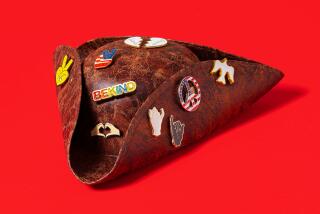France, America’s longtime champion
- Share via
Author Daniel Jouve likes to peer through an iron fence outside the Hotel de Coislin in Paris, where Benjamin Franklin emerged as a citizen of an independent nation. It was Feb. 6, 1778, and across the Atlantic, American colonists were fighting a bloody revolution that would last five more years.
But in terms of foreign relations, the United States was born that day in Paris, when Franklin, his diplomatic colleagues and a representative of King Louis XVI signed the Treaties of Friendship, Commerce and Alliance, making France the first nation in the world to recognize America’s sovereignty.
That explains the title of Jouve’s book, “Paris: Birthplace of the U.S.A.,” which guides tourists to 23 sites in the City of Light bearing witness to the indispensable support France gave America in its pursuit of independence.
Alice Jouve, Daniel’s wife and one of the book’s co-authors, said in an interview that America wasn’t organized and had no money until the French started sending battle-hardened soldiers and funds to the insurgent Colonies. In 1781, the French Royal Navy under Adm. Francois-Joseph-Paul de Grasse held off British warships at the mouth of Chesapeake Bay while French and American forces whipped the enemy at Yorktown, Va., a decisive battle in the War of Independence.
I like to remember such facts when I think of strained relations between America and France over foreign policy. Daniel, who is French, and Alice, who was born in Boston, reminded me that our countries had been at odds over the war in Iraq for just two years, a blink in time compared with 225 years of mostly cordial relations.
The alliance between France and America that Ben Franklin signed at the Hotel de Coislin in 1778 guaranteed America would never reconcile with Britain as long as France remained at war with its testy neighbor across the English Channel. But American diplomats did just that, signing a preliminary separate peace with England in 1782.
When I asked Daniel Jouve why the French didn’t retaliate for this American betrayal, he smiled and said, “We’d lent you a lot of money to fight the Revolution and wanted to make sure we got it back.”
Daniel Jouve, who has the frame of Charles de Gaulle and the high color of Santa Claus, has long been interested in French-American history. Diminutive Alice Jouve received a degree in French literature at the Sorbonne in Paris but returned home to teach French. She met Daniel in Boston while he was studying at Harvard Business School.
The Jouves, who live in Paris, have been married nearly 40 years and have three grown children, all of whom live in the United States.
Alice designs and leads historical-themed tours of France for American universities. She told me, unequivocally, that the French love Americans, though visitors find that out only if they meet French people.
Daniel, who runs an executive recruiting firm, said sometimes even he couldn’t stand the narrow-mindedness of the French. “When a French person starts a sentence with ‘les Americains,’ ” he said, “I know whatever is coming is likely to be wrong.”
Over lunch, I watched them closely for hints about how they’ve made their marriage work, hoping to draw parallels about ways to improve French-American relations. They didn’t fight over the little pieces of chocolate that came with coffee after the meal, but when the conversation turned to the transfer of French territory in America to the U.S. in 1803, he said, “That’s a problem. My wife calls it the Louisiana Purchase. I call it the Louisiana Sale.”
It was pure pleasure to talk French-American history with the Jouves. They know so many juicy details: More than three dozen U.S. cities bear the name of the Marquis de Lafayette, an honorary American citizen whose descendants still have the right to carry U.S. passports.
And, during the American Revolution, French women took a liking to dashing John Paul Jones, the American naval hero who told a British commander, “I have not yet begun to fight.” But they positively doted on avuncular Benjamin Franklin, who spent several stints as a diplomat and conducted electricity experiments in Paris.
Some historians think the thrashing France took from England during the Seven Years’ War (1756-1763) explains the French embrace of the American revolutionary cause. But the Jouves said the relationship was cemented by more factors than self-interest, including shared respect for the rights of man (which sparked the French to rebel against their king little more than a generation after the American War of Independence) and great, charismatic figures such as Franklin and Lafayette.
After lunch, I didn’t have to stroll far to find sites mentioned in the Jouves’ book, starting with the Hotel de Coislin at No. 4 Place de la Concorde, where the 1778 alliance between America and France was signed.
At the nearby House of Odiot, an elegant silver shop founded in 1690 on the Place de la Madeleine, I saw a wine goblet favored by the main author of the Declaration of Independence, still made by the firm and called a “Jefferson cup.” A few blocks east, I found the mansion where Lafayette married at the tender age of 17 and the final resting place of De Grasse in the lugubrious church of Saint-Roch.
There, I had to shake my head at the very suggestion Americans should call French fries “freedom fries,” in short-sighted antipathy toward France. Besides, the phrase takes on a whole new meaning when you stand at the tomb of the French admiral who vanquished an English fleet on Chesapeake Bay, thereby helping secure American independence.
Susan Spano also writes “Postcards From Paris,” which can be read at www.latimes.com/susanspano.
More to Read
Sign up for our Book Club newsletter
Get the latest news, events and more from the Los Angeles Times Book Club, and help us get L.A. reading and talking.
You may occasionally receive promotional content from the Los Angeles Times.










